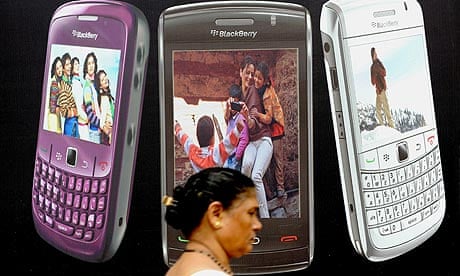BlackBerry-maker Research In Motion has hit back at reports that it is ready to allow Indian authorities access to customers' highly-secure corporate emails.
The Canadian manufacturer slammed as "false and technologically infeasible" an Economic Times of India report which said that it will allow the Indian government access to all messages and emails sent by its 400,000 BlackBerry customers in the country. An internal home ministry memo, apparently seen by the paper, suggested that RIM would automatically make readable all BlackBerry communications, including encrypted enterprise emails.
RIM quickly refuted the charges, saying that only an account holder has the necessary key to decrypt the messages. But it confirmed that security authorities and mobile operators will be granted "lawful access" to the popular BlackBerry Messenger chats.
The high-end mobile maker is battling to resolve a three-year dispute in the region, with countries including Saudi Arabia, United Arab Emirates (UAE) and India demanding access to BlackBerry communications, citing threats to national security. RIM has until 31 January to placate India's fears or risk being kicked out of the country. The region's mobile security fears were heightened by reports that the Mumbai terrorists used secure BlackBerrys to plot their attacks.
India is an important market for RIM. Informa Telecoms & Media forecast that more than 600,000 BlackBerrys will have been sold there this year, and that India's smartphone market will grow rapidly from 12m now to 40m by the end of 2015.
A note sent internally in Delhi's home ministry, seen by the Economic Times, said: "In the final solution proposed by RIM, the decoding will be automatic. Intercepted and decoded data will not travel out of India. RIM has proposed to install [network data analysis systems] in India. In the final solution, intercepted and decoded data will travel between service providers and RIM India."
RIM reiterated that it cannot aid access to the highly-secure enterprise emails – largely used by businesses and high-ranking civil servants – because only the account holder has the necessary key to decrypt the messages. "This [media report] is both false and technologically infeasible," a RIM spokesman said. "There will be no change to the security model of BlackBerry Enterprise Service."
The company added that any "lawful access" negotiations would abide by four principles: that it was legal, that there would be "no greater access" to BlackBerry services than other services, that there would be no changes in the security for Enterprise customers, and it would not make "specific deals for specific customers".
If governments gain access to the content of BlackBerry Messenger (BBM) chats, popular among younger BlackBerry owners, it could have far-reaching consequences in neighbouring countries. In the UAE, which is also likely to push for similar levels of access to India, BBM chats are used as an effective broadcasting tool – adept at covertly spreading messages and "gossip".
A university professor in the UAE, who wished to remain anonymous, told the Guardian in September: "Since virtually every Emirati aged 17 to 40 owns a BlackBerry and uses the messenger feature constantly, [reports of UAE access to BBM messages] has been of great concern to them.
"I'd guess that around 30% accept this is for security reasons, while the rest believe it to be, at the least, intrusive. The latter believe it to be a response to a number of fairly high-profile Emiratis being attacked, derided, vilified via the messenger broadcast service. Emiratis send many broadcasts daily, and gossip runs through the community like wildfire."

Comments (…)
Sign in or create your Guardian account to join the discussion